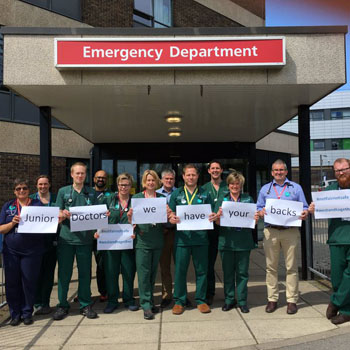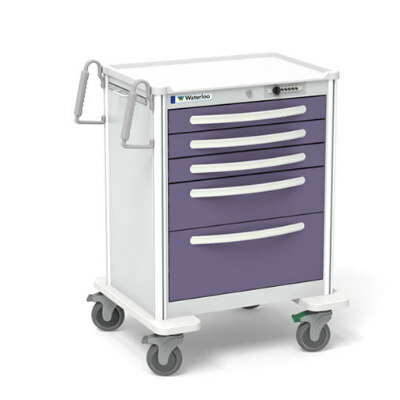English Junior Doctors Strike Over new NHS Contract
|
By HospiMedica International staff writers Posted on 09 May 2016 |

Image: Senior doctors in support of their junior colleagues (Photo courtesy of Dr. Sophie Gough).
The all-out strikes, a precedent in the nearly 70-year history of the National Health Service (NHS, London), are part of the escalating running dispute with the government over a new contract for junior doctors.
The strikes are the fifth and sixth by junior doctors in England since the dispute began in 2015, but during the four previous ones only non-urgent services were affected. This time, 55,000 junior doctors--a term that includes recent medical school graduates, as well as doctors who have been working for over a decade--walked out from all services, including accident and emergency, maternity, and intensive care. NHS services in Scotland, Wales, and Northern Ireland, which are managed separately from England, were not affected by the strike.
According to NHS England, “military level” planning had gone into making sure that patients in need of urgent care would be properly treated, with more consultants on hand to provide essential services. In addition, about 13,000 elective operations and 113,000 outpatient appointments were canceled to free up consultants to provide urgent care during the first strike, which was followed several days later by another.
“It is a good deal and even if you don’t agree with that deal, the question is whether it is appropriate or proportionate to take this action today for the first time in the NHS that the doctors who we depend on will not be providing emergency cover,” said UK health secretary Jeremy Hunt. “We are doing everything we can to make sure it’s provided by other doctors — senior doctors — but of course hospitals up and down the country are extremely worried about the service they are going to be able to provide.”
At the heart of the dispute is a new contract which the government plans to impose on junior doctors that will enable NHS services to be organized in a way that makes it easier for patients to access care seven days a week. While the new contract will increase junior doctors' basic pay, it will reduce the number of weekly hours considered anti-social, and thus entitled for extra pay. For example, junior doctors will no longer be paid extra for daytime work on Saturdays. The doctors claim that the end result will be that they will be forced to work longer hours at anti-social times.
Related Links:
National Health Service
The strikes are the fifth and sixth by junior doctors in England since the dispute began in 2015, but during the four previous ones only non-urgent services were affected. This time, 55,000 junior doctors--a term that includes recent medical school graduates, as well as doctors who have been working for over a decade--walked out from all services, including accident and emergency, maternity, and intensive care. NHS services in Scotland, Wales, and Northern Ireland, which are managed separately from England, were not affected by the strike.
According to NHS England, “military level” planning had gone into making sure that patients in need of urgent care would be properly treated, with more consultants on hand to provide essential services. In addition, about 13,000 elective operations and 113,000 outpatient appointments were canceled to free up consultants to provide urgent care during the first strike, which was followed several days later by another.
“It is a good deal and even if you don’t agree with that deal, the question is whether it is appropriate or proportionate to take this action today for the first time in the NHS that the doctors who we depend on will not be providing emergency cover,” said UK health secretary Jeremy Hunt. “We are doing everything we can to make sure it’s provided by other doctors — senior doctors — but of course hospitals up and down the country are extremely worried about the service they are going to be able to provide.”
At the heart of the dispute is a new contract which the government plans to impose on junior doctors that will enable NHS services to be organized in a way that makes it easier for patients to access care seven days a week. While the new contract will increase junior doctors' basic pay, it will reduce the number of weekly hours considered anti-social, and thus entitled for extra pay. For example, junior doctors will no longer be paid extra for daytime work on Saturdays. The doctors claim that the end result will be that they will be forced to work longer hours at anti-social times.
Related Links:
National Health Service
Latest Hospital News News
- Nurse Tracking System Improves Hospital Workflow
- New Children’s Hospital Transforms California Healthcare
- Noisy Hospitals Face Threat of Decreased Federal Compensation
- Orthopedics Centre of Excellence Planned for Guy’s Hospital
- Research Suggests Avoidance of Low-Value Surgical Procedures
- U.S. Federal Readmission Fines Linked to Higher Mortality
- Columbia China to Build New Hospital in Jiaxing
- Dubai Debuts Second Robotic Pharmacy Service
- Seattle Hospital Network Shifts Away from Overlapping Surgeries
- ACC to Launch Valvular Heart Disease Program in China
- Mortality Rates Lower at Major Teaching Hospitals
- South Australia to Inaugurate Upscale Hospital
- Raffles to Launch Second Hospital Project in China
- Research Center Tackles Antimicrobial Drugs Challenge
- Miami Cardiac & Vascular Institute Completes Expansion Project
- Hospital Antibiotic Policies Improve Prescription Practices
Channels
Artificial Intelligence
view channel
AI-Powered Algorithm to Revolutionize Detection of Atrial Fibrillation
Atrial fibrillation (AFib), a condition characterized by an irregular and often rapid heart rate, is linked to increased risks of stroke and heart failure. This is because the irregular heartbeat in AFib... Read more
AI Diagnostic Tool Accurately Detects Valvular Disorders Often Missed by Doctors
Doctors generally use stethoscopes to listen for the characteristic lub-dub sounds made by heart valves opening and closing. They also listen for less prominent sounds that indicate problems with these valves.... Read moreCritical Care
view channel
Powerful AI Risk Assessment Tool Predicts Outcomes in Heart Failure Patients
Heart failure is a serious condition where the heart cannot pump sufficient blood to meet the body's needs, leading to symptoms like fatigue, weakness, and swelling in the legs and feet, and it can ultimately... Read more
Peptide-Based Hydrogels Repair Damaged Organs and Tissues On-The-Spot
Scientists have ingeniously combined biomedical expertise with nature-inspired engineering to develop a jelly-like material that holds significant promise for immediate repairs to a wide variety of damaged... Read more
One-Hour Endoscopic Procedure Could Eliminate Need for Insulin for Type 2 Diabetes
Over 37 million Americans are diagnosed with diabetes, and more than 90% of these cases are Type 2 diabetes. This form of diabetes is most commonly seen in individuals over 45, though an increasing number... Read moreSurgical Techniques
view channel
Miniaturized Implantable Multi-Sensors Device to Monitor Vessels Health
Researchers have embarked on a project to develop a multi-sensing device that can be implanted into blood vessels like peripheral veins or arteries to monitor a range of bodily parameters and overall health status.... Read more
Tiny Robots Made Out Of Carbon Could Conduct Colonoscopy, Pelvic Exam or Blood Test
Researchers at the University of Alberta (Edmonton, AB, Canada) are developing cutting-edge robots so tiny that they are invisible to the naked eye but are capable of traveling through the human body to... Read more
Miniaturized Ultrasonic Scalpel Enables Faster and Safer Robotic-Assisted Surgery
Robot-assisted surgery (RAS) has gained significant popularity in recent years and is now extensively used across various surgical fields such as urology, gynecology, and cardiology. These surgeries, performed... Read morePatient Care
view channelFirst-Of-Its-Kind Portable Germicidal Light Technology Disinfects High-Touch Clinical Surfaces in Seconds
Reducing healthcare-acquired infections (HAIs) remains a pressing issue within global healthcare systems. In the United States alone, 1.7 million patients contract HAIs annually, leading to approximately... Read more
Surgical Capacity Optimization Solution Helps Hospitals Boost OR Utilization
An innovative solution has the capability to transform surgical capacity utilization by targeting the root cause of surgical block time inefficiencies. Fujitsu Limited’s (Tokyo, Japan) Surgical Capacity... Read more
Game-Changing Innovation in Surgical Instrument Sterilization Significantly Improves OR Throughput
A groundbreaking innovation enables hospitals to significantly improve instrument processing time and throughput in operating rooms (ORs) and sterile processing departments. Turbett Surgical, Inc.... Read moreHealth IT
view channel
Machine Learning Model Improves Mortality Risk Prediction for Cardiac Surgery Patients
Machine learning algorithms have been deployed to create predictive models in various medical fields, with some demonstrating improved outcomes compared to their standard-of-care counterparts.... Read more
Strategic Collaboration to Develop and Integrate Generative AI into Healthcare
Top industry experts have underscored the immediate requirement for healthcare systems and hospitals to respond to severe cost and margin pressures. Close to half of U.S. hospitals ended 2022 in the red... Read more
AI-Enabled Operating Rooms Solution Helps Hospitals Maximize Utilization and Unlock Capacity
For healthcare organizations, optimizing operating room (OR) utilization during prime time hours is a complex challenge. Surgeons and clinics face difficulties in finding available slots for booking cases,... Read more
AI Predicts Pancreatic Cancer Three Years before Diagnosis from Patients’ Medical Records
Screening for common cancers like breast, cervix, and prostate cancer relies on relatively simple and highly effective techniques, such as mammograms, Pap smears, and blood tests. These methods have revolutionized... Read morePoint of Care
view channel
Critical Bleeding Management System to Help Hospitals Further Standardize Viscoelastic Testing
Surgical procedures are often accompanied by significant blood loss and the subsequent high likelihood of the need for allogeneic blood transfusions. These transfusions, while critical, are linked to various... Read more
Point of Care HIV Test Enables Early Infection Diagnosis for Infants
Early diagnosis and initiation of treatment are crucial for the survival of infants infected with HIV (human immunodeficiency virus). Without treatment, approximately 50% of infants who acquire HIV during... Read more
Whole Blood Rapid Test Aids Assessment of Concussion at Patient's Bedside
In the United States annually, approximately five million individuals seek emergency department care for traumatic brain injuries (TBIs), yet over half of those suspecting a concussion may never get it checked.... Read more
New Generation Glucose Hospital Meter System Ensures Accurate, Interference-Free and Safe Use
A new generation glucose hospital meter system now comes with several features that make hospital glucose testing easier and more secure while continuing to offer accuracy, freedom from interference, and... Read moreBusiness
view channel
Johnson & Johnson Acquires Cardiovascular Medical Device Company Shockwave Medical
Johnson & Johnson (New Brunswick, N.J., USA) and Shockwave Medical (Santa Clara, CA, USA) have entered into a definitive agreement under which Johnson & Johnson will acquire all of Shockwave’s... Read more














